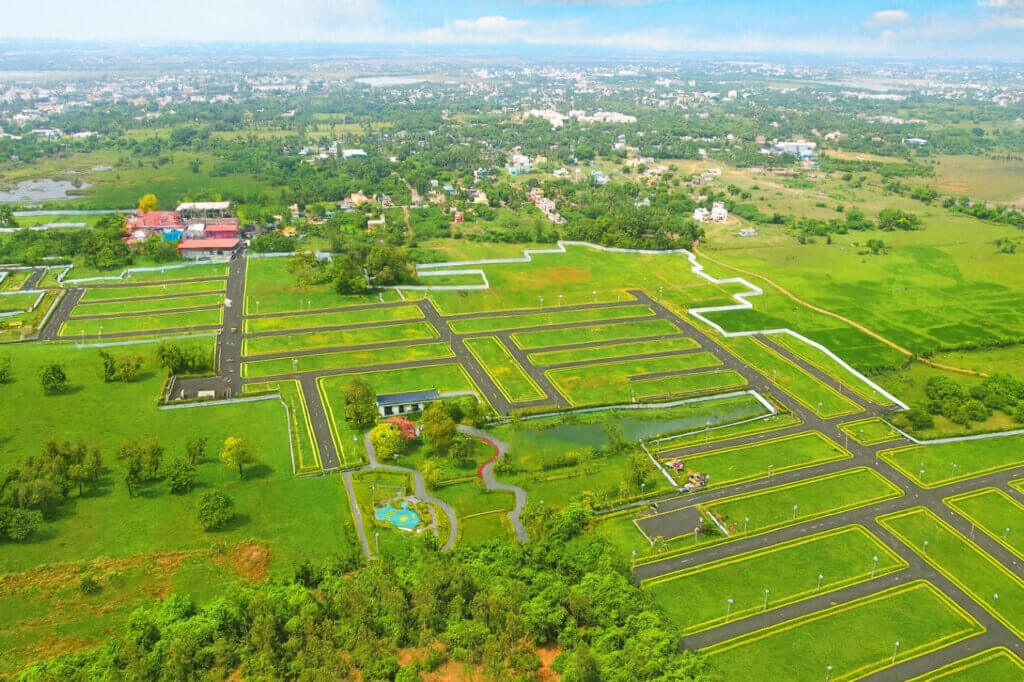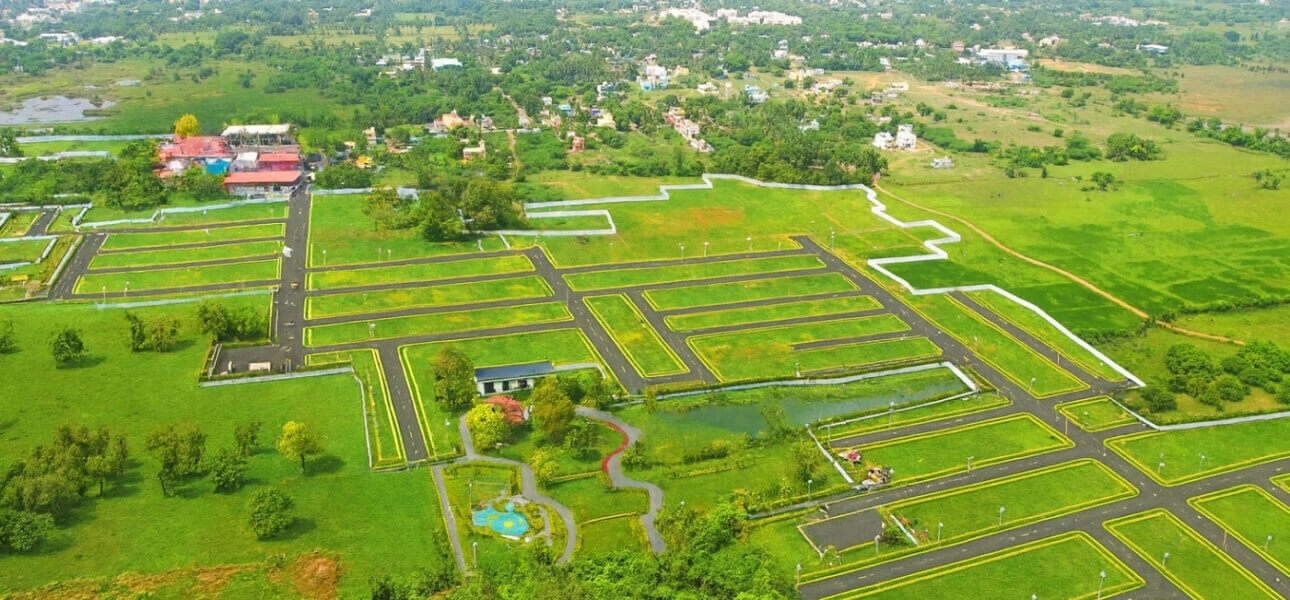Warm morning showers feel better when they are guilt free and low on the monthly bill. In sunny belts like Padappai and Oragadam, two choices stand out for hot water at home. Should you go with a traditional solar water heater or install rooftop solar PV and use an electric geyser

What Are You Really Comparing
A solar water heater uses the sun to heat water directly. Rooftop PV panels generate electricity from sunlight and power your household geyser.
Both rely on sunshine but their hardware, maintenance, and long term savings differ. Your choice depends on family size, roof space, water quality, aesthetics, and the kind of home you are building at Velammal Garden.
How a Solar Water Heater Works
- Collector types
- Flat Plate Collectors are rugged and suit most Chennai homes.
- Evacuated Tube Collectors perform better on cloudy days and in slightly cooler regions.
- Storage tank
An insulated tank keeps water hot for hours. Gravity flow is common, so the tank typically sits on the terrace. - No electricity needed for heating
Only small pumps or sensors may need minimal power in pressurised systems.
How PV + Geyser Works
- PV modules on the roof feed a grid tied inverter or a hybrid inverter with battery.
- Standard electric geyser heats water whenever you switch it on.
- Net metering where available lets you export excess solar power during the day and draw power later.
Cost Snapshot for a Villa in Padappai
- Solar water heater
Upfront cost is usually lower per litre of hot water capacity. A 200 to 300 litre system often meets a 4 to 6 member family.
Plumbing and structural supports are part of the install. - PV + geyser
Higher initial spend if you size PV to cover household loads plus water heating. The upside is versatile electricity for lights, fans, fridge, and EV charging in the future.
Tip. If your budget is tight now but you plan to grow loads later, PV creates a base that benefits the whole home, not just hot water.
Efficiency and Performance in Chennai Weather
- Solar water heater is highly efficient at turning sunlight to hot water directly. On clear days you get piping hot water by 9 to 10 am. During heavy monsoon spells you may need an electric backup coil.
- PV + geyser is flexible. Even on dull days PV still generates something. You can top up from the grid and the shower routine remains unchanged.
- Morning vs evening use
If your family bathes mostly in the morning, both systems work well. If evenings are common, PV has an edge because you can run the geyser on grid or battery without waiting for sun heated storage.
Roof Space and Aesthetics
- Solar water heater needs a south facing tilt and a visible tank. Some homeowners do not prefer the look of terrace tanks.
- PV lies flat or at a low tilt and looks uniform. If you are planning a clean modern terrace at Velammal Garden, PV is usually easier to integrate with pergolas and rooftop gardens.
Water Quality Matters
Padappai and neighbouring suburbs often face hard water. Hard water causes scaling.
- Solar water heaters face scale build up inside tubes and tanks. Plan for periodic descaling or a softener at source.
- Geysers also scale but are simpler to service or replace. PV panels are unaffected by hardness in water supply.
Maintenance and Reliability
- Solar water heater
- Annual cleaning of collectors and descaling in hard water areas
- Check for leaks, valves, and insulation
- Tanks may need replacement after many years
- PV + geyser
- PV panels need occasional cleaning of dust and bird droppings
- Inverter replacement may arise after a long service life
- Geyser maintenance is standard plumbing
If you want set and forget simplicity, PV plus a branded geyser is often easier to live with over a decade.
Safety and Comfort
- Overheating risk. Solar water heaters can deliver very hot water at noon. Use thermostatic mixing valves to avoid scalding.
- Pressure. For rain showers and multiple bathrooms, choose a pressurised solar heater or stick to PV plus a pressurised geyser so you keep uniform flow.
Running Costs and Payback
- Solar water heater
Saves the power a geyser would consume. Payback is often faster if you only need hot water savings. Best for families that bathe daily and use washing machines with hot inlets. - PV + geyser
Offsets your entire home’s daytime electricity. Even if hot water consumption varies, your panels work for fans, fridge, and work from home loads. Payback is spread across all uses.
For villa plot buyers at Velammal Garden, PV supports future upgrades like induction cooking, home office, and EV charging, improving lifestyle and resale value.
When to Choose Solar Water Heater
- You want the lowest cost route to solar hot water
- Your family has a fixed morning bathing schedule
- You can place a tank on the terrace without aesthetic concerns
- You are okay with basic annual servicing
When to Choose PV + Geyser
- You want one system that powers the whole home
- You prefer a clean terrace design without visible tanks
- You expect evening showers and flexible timing
- You plan EV charging or home office loads in future
Smart Hybrid Option
Some homeowners install a smaller capacity solar water heater for guaranteed morning hot water and add a modest PV array for the rest of the home. The geyser remains as backup. This reduces risk during monsoon weeks and keeps comfort high.
Planning Tips for Velammal Garden Homes
- Size to lifestyle. For a 3 BHK villa, 200 to 300 litres in solar water heating or a 2 to 3 kW PV starter system is a practical base.
- Plumbing first. Route hot and cold lines thoughtfully while building. Future proof with a provision for mixing valves and recirculation if needed.
- Orientation. Ensure shadow free zones from water tanks, parapet walls, and neighbouring villas.
- Warranty and service. Pick local installers with quick service response across Padappai, Oragadam, and Tambaram corridors.
- Documentation. Keep system drawings and invoices handy for resale conversations. Upgrades like PV often strengthen the pitch when you list in future.
For site visits, layout guidance, and sustainable home planning inside a DTCP and RERA approved community, explore velammalgarden.com. Our team can help you plan roof space, conduit runs, and inverter locations during your villa design so you avoid rework later. You can also connect through velammalgarden.com to schedule a walk through and see where solar makes the most sense on your chosen plot.
Quick Comparison Table
Goal
- Lowest cost hot water. Solar water heater
- Whole home energy flexibility. PV + geyser
Look and space
- Visible terrace tank. Solar water heater
- Clean panel array. PV + geyser
Monsoon comfort
- Needs backup coil. Solar water heater
- Run geyser on grid or battery. PV + geyser
Water quality sensitivity
- Higher scaling risk. Solar water heater
- Standard geyser scaling only. PV + geyser
Future readiness
- Hot water focused. Solar water heater
- Supports EV, office, cooking. PV + geyser
Bottom Line
If hot water is the only priority and you want the fastest payback, a well sized solar water heater still wins for many Padappai families. If you want lifestyle flexibility, a neat terrace, and all round energy savings, begin with PV and run a high efficiency geyser. Either way, design early with your builder so piping, wiring, and roof space are optimised from day one.
FAQs
Is a solar water heater enough during the Chennai monsoon
It works on bright days and warm overcast days but during continuous rain you may need the electric backup coil. PV plus geyser keeps full flexibility by drawing from grid when required.
How much roof space do I need
A 200 litre solar water heater needs clear space for collectors and a tank. A 2 to 3 kW PV starter system usually needs around 150 to 250 square feet depending on panel wattage and layout.
Will hard water damage my system
Hard water causes scale in collectors, tanks, and geyser heating elements. Use a softener at source or schedule regular descaling. PV panels are not affected by water hardness.
Which is better for resale value
Both are attractive. PV often scores higher with tech savvy buyers because it lowers whole home bills and supports future appliances. Proper documentation of either system helps you negotiate better.
Can I install both
Yes. A smaller solar water heater for assured morning hot water plus a PV array for household loads is a smart hybrid. It reduces risk in monsoon weeks and keeps showers comfortable year round.


